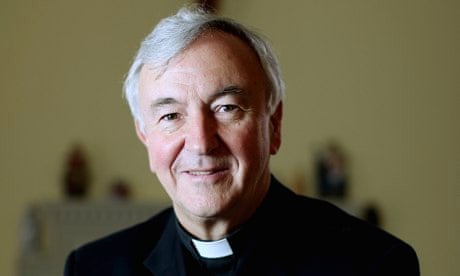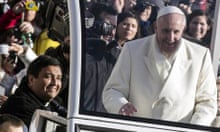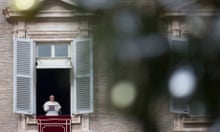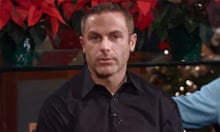Vincent Nichols, the archbishop of Westminster, is to become a cardinal after Pope Francis included him on a list of 16 new "princes of the church" eligible to vote in papal conclaves.
At a ceremony known as a consistory on 22 February, the Argentinian pontiff will create his first batch of cardinals who, clad in their distinctive red hats, represent the highest ranks of the Roman Catholic clergy. Several of the other new cardinals are from developing countries.
Sixteen of the prelates Francis named on Sunday are under 80 and therefore young enough to be able to take part in the election of his successor. The pope also announced he was promoting three older men to the rank of cardinal, but they will not be able to vote in conclaves.
Speaking from his studio window to pilgrims in St Peter's Square after the Sunday angelus, or blessing, Francis read out the list of 19 men, aged from 55 to 98, whom he had selected.
Coming from 12 countries from "every part of the world", he said, the 16 cardinal electors "represent the deep ecclesial relationship between the church of Rome and the other churches throughout the world".
In what appeared to be a delicate balancing act between Vatican convention and Francis's spirit of innovation, the pope included four senior figures from the Roman curia on the list: his secretary of state, Pietro Parolin; Gerhard Ludwig Müller, prefect of the powerful congregation for the doctrine of the faith (CDF); Lorenzo Baldisseri, secretary general of the synod of bishops; and Beniamino Stella, prefect of the congregation for the clergy.
But, in keeping with his desire to rebalance church governance and steer the institution away from being overly Vatican-centric, Francis ensured the remaining 12 cardinal electors were archbishops or bishops based around the world, from Canada to Korea.
Central and South America was the region best represented, with Nicaragua, Haiti, Brazil, Chile and Argentina each producing a cardinal-elect. It had been considered almost inevitable that the pope's successor as archbishop of Buenos Aires, Mario Aurelio Poli, would be named.
But others, such as Jean-Pierre Kutwa, archbishop of Abidjan in Ivory Coast, were more unexpected, and could be seen as reflecting the other major concern of Francis's 10 month-old pontificate: the poor.
Nichols's elevation comes almost a year after British Catholics found themselves with no cardinal taking part in the papal election prompted by Benedict XVI's resignation. Cormac Murphy-O'Connor, the archbishop emeritus of Westminster, had already celebrated his 80th birthday, while Keith O'Brien, the Scottish cardinal and archbishop emeritus of St Andrews and Edinburgh, resigned in February following allegations of "inappropriate acts" involving junior priests, and said he would not go to Rome for the conclave.
Nichols, 68, said he was deeply moved by the "humbling" honour. "The Catholic church in our countries has always had a profound and loving loyalty to the Holy Father, the successor of Saint Peter. This appointment enables me, on behalf of all, to serve the pope in a direct and prolonged way," he said.
"I seek the blessing of Almighty God for these new responsibilities and I ask for the prayers of all people of faith that I may fulfil them with energy and devotion."
His inclusion had been predicted by many – not only because of convention but also because of a pastoral record likely to chime with a pope who wants a church that goes "out on the streets".
Despite the immutable nature of church teaching on homosexuality and his own criticisms of the government's gay marriage plans, Nichols's outspoken defence of fortnightly masses for gay, lesbian and transgender Roman Catholics won him gratitude and respect.
The Soho masses ended a year ago, reputedly because of pressure from the Vatican and an outcry from traditionalist British Catholics who disapproved of what they saw as a celebration of homosexuality.
For six years, however, they were a fixture – and staunchly defended by the archbishop. In 2010, Nichols laid into critics of the Soho masses, saying: "Anybody from the outside who is trying to cast a judgment on the people who come forward for communion really ought to learn to hold their tongue."
It was a sentiment echoed by Pope Francis, who last year declared: "If someone is gay and seeks the Lord with good will, who am I to judge?"
It had been rumoured that Müller, one of Nichols's fellow cardinal-elects who was appointed prefect of the CDF in July 2012, had been keen to stop the masses and clamp down on any perceived challenges to Rome's authority.
When he announced the end of the masses, Nichols stressed that the church's "teaching on matters of sexual morality" remained unaltered despite recent legal and social changes surrounding "same-sex attraction".
But he has also hinted that the church could find itself forced to show more flexibility when it comes to its treatment of same-sex unions. Asked in a BBC interview whether the Roman Catholic church might eventually find itself imitating the Church of England – some of whose vicars have unofficially blessed gay unions for years, he replied: "I don't know. Who knows what's down the road?"
According to Austen Ivereigh, ex-director of public affairs for Murphy-O'Connor and co-ordinator of Catholic Voices, Nichols's commitment to a more inclusive church closely resembles that of the pope. "If anything, I think Francis would be extremely sympathetic to the Soho masses," he said.
"Francis likes pastoral bishops; he likes bishops with the smell of sheep and Vincent is a very experienced pastoral bishop and has a very pastoral approach to the sacraments – as he demonstrated with his open-door policy in the church, which I think is very much in the mould of Francis."



